Life sciences project grows larger. Are downtown Chapel Hill businesses, vibe at risk?
A life sciences project that’s ignited a campaign to save a popular restaurant could create the tallest building in downtown Chapel Hill and cover even more land than expected, a town advisory board learned Tuesday night.
The proposed Chapel Hill Life Sciences Center would bring roughly 320,000 square feet of laboratory, office and retail space to 306 W. Franklin St. The project also could include some storefronts on West Rosemary Street, plus a 320-space parking deck.
The building would sit at the lowest elevation on Franklin Street and be 150 to 160 feet tall, project officials said. That would include a roughly 20-foot-tall mechanical penthouse to serve the laboratory spaces, making it the tallest building downtown.
A wet lab and office building approved up the hill, at the east end of Rosemary Street, could be about 140 feet tall, including its mechanical penthouse. That’s five feet taller than Greenbridge at 601 W. Rosemary St., which was controversial when proposed in 2007, and 35 feet taller than the 140 West Franklin condominiums, which opened in 2013.
County records show Boston-based developer Longfellow Real Estate Partners paid $13.2 million last year to buy five lots that make up the project site. The land also includes three parking lots and wraps around Fifth Third Bank, which is not part of the redevelopment.
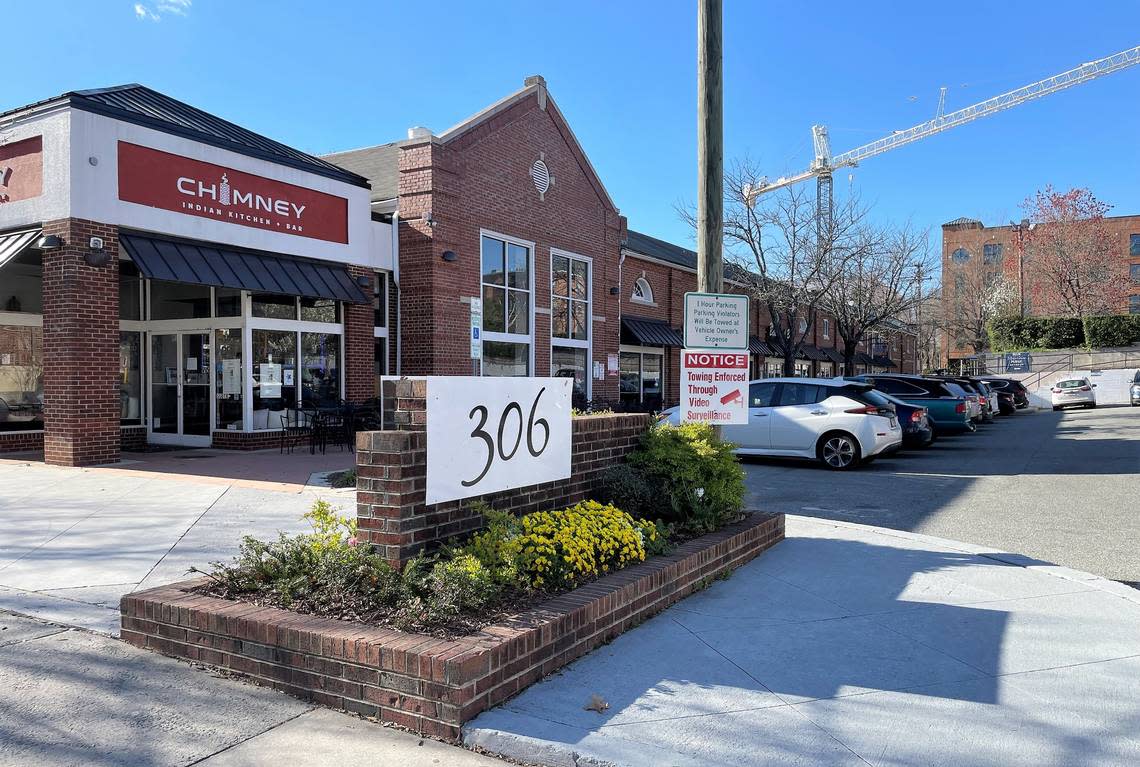
It would replace a 1 1/2-story building that houses several businesses, including Blue Dogwood Public Market food hall, Chimney Indian Kitchen & Bar, and the Purple Bowl.
Launch Chapel Hill, a startup accelerator and co-working space founded by UNC, the town and Orange County, moved out of the building in February to the new Innovation Hub at 137 E. Franklin St. and 136 E. Rosemary St.
On Tuesday, the Community Design Commission learned another longtime business, the Bicycle Chain, could be added to the mix, creating a 2.23-acre project site. Greg Capps, managing director of Longfellow Real Estate Partners, said they are talking with the shop’s property owner, who lives in Carrboro, but there’s no deal yet.
The council could review the concept plan on March 22 and provide feedback that could be used to draft a formal application.
The council would have to rezone the site to Town Center-3 to allow a taller, more densely populated building. Key issues also could include traffic, parking and stormwater, since the site is prone to flooding.
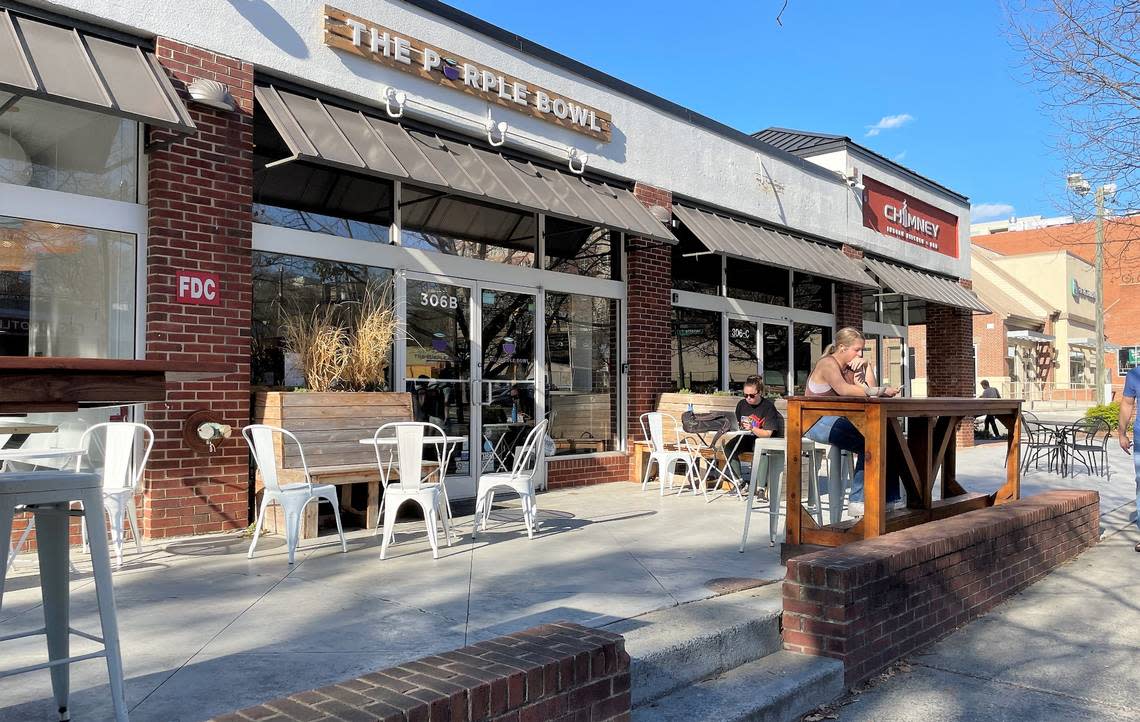
Save Purple Bowl campaign
Since Longfellow announced the project in November, Purple Bowl staff and fans have inundated the town with emails and phone calls, hoping to save the business.
Owner Taylor Gilland told The News & Observer in an interview last year that he and his parents knew the landlord wanted to sell, and they offered to buy the building last year while completing a $500,000 expansion into the adjacent space.
At the time, they were talking with investors and Durham brewers about adding a beer garden and 10,000-square-foot rooftop deck, said Gilland, who started the business with his parents in 2017. They contacted Longfellow over the summer about their options and got little response, he said. They were surprised when the project was announced in November.
On Tuesday, Gilland told the commissioners that Chapel Hill’s “college town charm is something that I think other towns, I think, would do anything for and something that everyone talks about around the whole country.”
“If they had it, I think they’d protect it, and we’re throwing it away,” he said. “We’re throwing away Chapel Hill’s funk, its character, over the last five years with each development ... instead of investing” in older buildings.
He was joined by roughly a dozen other speakers, including his mother Paula Gilland, Purple Bowl staff, residents, and UNC students, athletes and alumni.
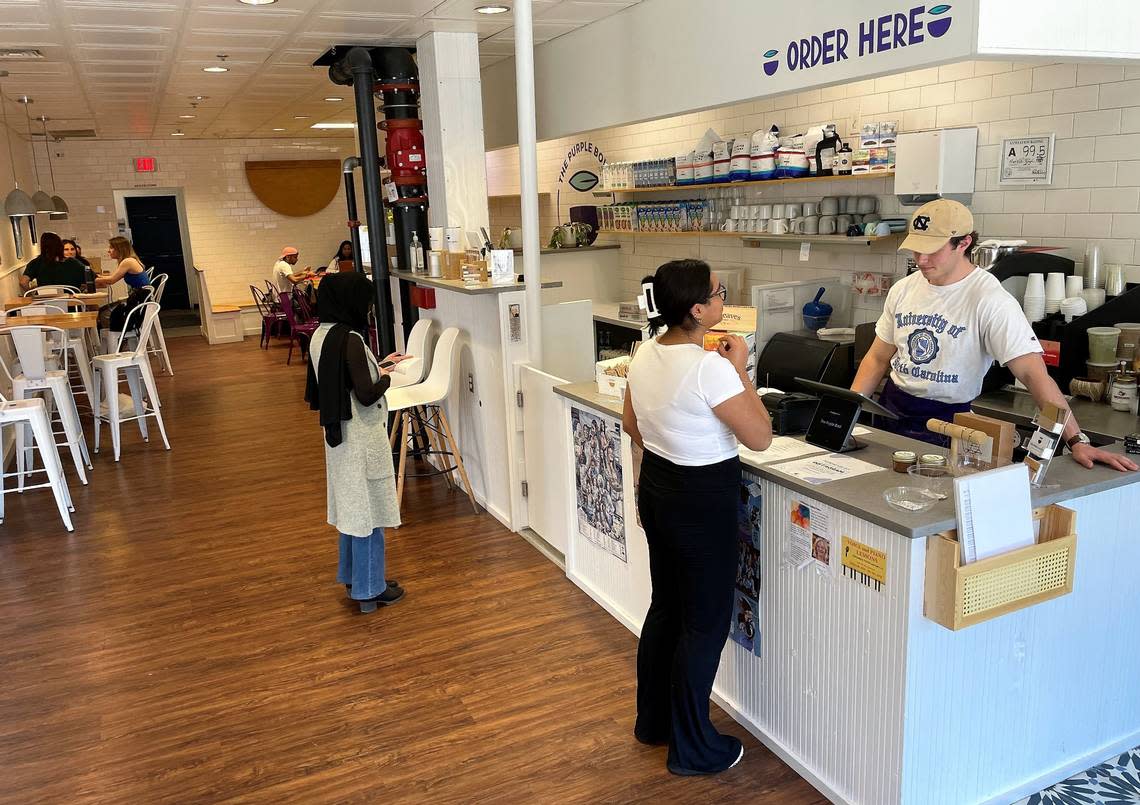
UNC graduate Varun Jain said he grew up in Singapore and Australia but found a home in a foreign country at Purple Bowl.
“If Chapel Hill continues to be this growing place that attracts so many individuals from across the state, the country and the world, it is businesses and operations like Purple Bowl that make that feeling come alive and make a small town like Chapel Hill really vibrant as a community and have a personality that I think is unique to many other places,” Jain said.
Lanier Hodgson was joined on screen at the virtual meeting by her husband Scott and their young children. Hodgson spoke about the importance of small businesses to families who visit downtown, as her daughter Bailey wiggled and grinned widely, chiming in with an enthusiastic whisper, “Purple Bowl!”
“If the town of Chapel Hill is looking to keep building up what makes this town special, we’ve got to protect its best brand, and that is where we build communities, and that’s exactly what this section of Franklin Street does,” Hodgson said.
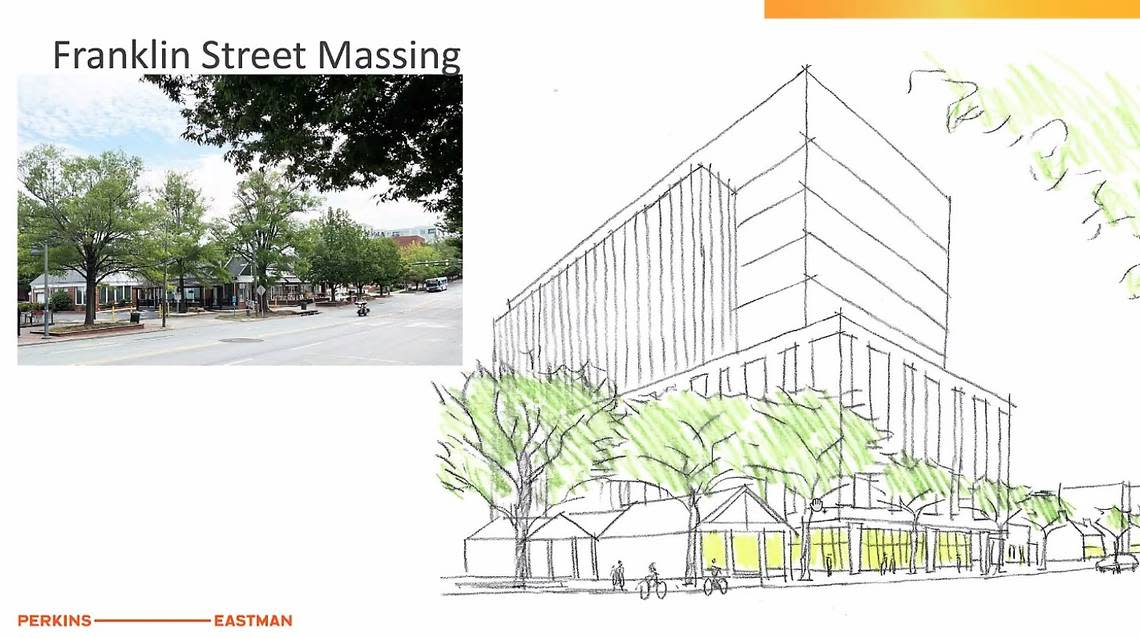
Board reacts to Longfellow project
While it was “an extraordinary amount of outpouring of feeling from a number of people,” CDC Chair John Weis said, the commission only reviews the project’s design, not how the building is used. He later urged the developer to take note of the comments.
“You should pay attention to the people who spoke about their appreciation for the uses and what that means to Chapel Hill,” Weis said.
Other commissioners asked several questions, but few offered comments, in some cases, citing a lack of information about the parking deck and the potential for changes if the developer buys the Bicycle Chain property.
Commissioner Megan Patnaik wanted to know how the project would reflect the community and tone of Franklin Street.
“I feel like the lab buildings at the other end of Franklin Street and Rosemary, I guess that makes sense, but this is an area that is smaller scale, that is where folks go to eat and drink,” she said.
The site was chosen for its large size, which is rare in downtown Chapel Hill, and because it offers the opportunity to create a public space that doesn’t exist on the west end of town, project architect Michael Stevenson said. The team is working to reduce the visual impact of the building, said senior project manager Nathan Zeidler.
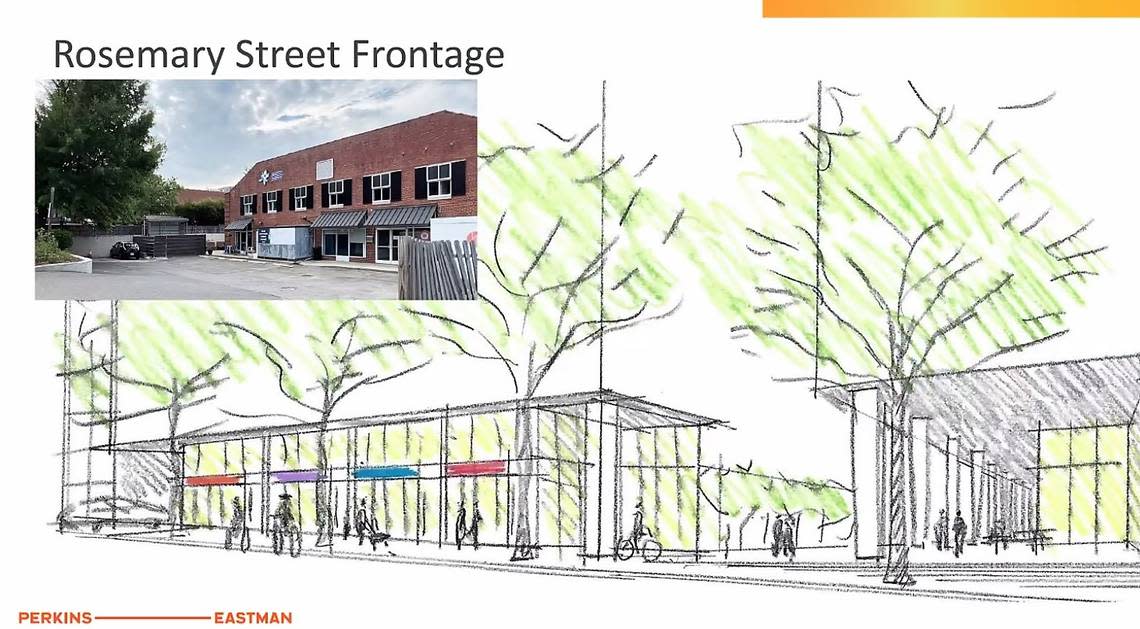
Commissioner Ted Hoskins said he appreciated the design so far, but suggested the developer take another look at ideas submitted by the town’s urban designer Brian Peterson, such as splitting the building into two and further reducing the project’s visual impact.
Longfellow also should think about how to relocate existing tenants instead of putting them out of business, Weis said.
“The point is you are looking for a rather substantial change in zoning here, and so the town could ask you to do something like that in return for the zoning,” Weis said.
The concerns about Purple Bowl represent more than just the loss of one business, Taylor Gilland told The N&O, as he questioned whether the town’s leadership is more motivated by money than what its residents desire.
“I think there’s a lot of frustration in the Chapel Hill community with the pace of corporate development downtown,” Taylor Gilland said. “We’re going from a small, charming downtown to corporate development with a lot of space in recent buildings sitting vacant right now.”
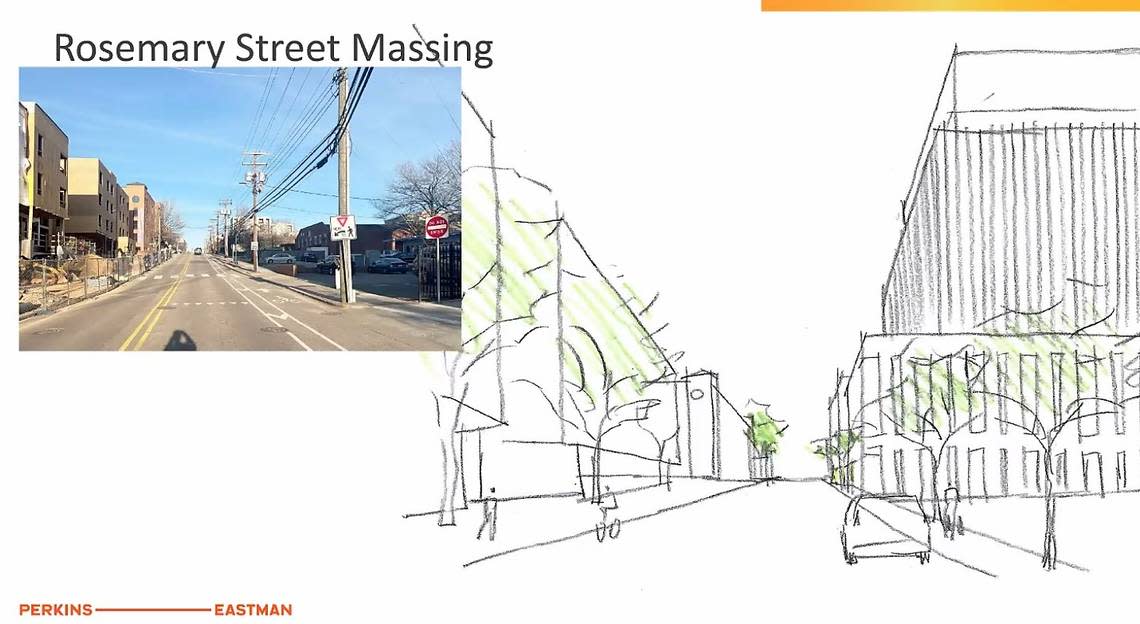
UNC startups, new companies
The last decade has seen more tall structures replacing older, two- and three-story buildings in Chapel Hill. The town has focused on creating more places to work and live downtown, in part to hold on to UNC-incubated startups that need room to grow.
Charlotte-based developer Grubb Properties is renovating the former CVS building at the heart of East Franklin Street and has another office and wet lab building in the works at 150 E. Rosemary St. Construction of the 238,000-square-foot project, approved in late 2021, could start once the town finishes building its parking deck at 125 E. Rosemary St.
Grubb’s projects are part of an Innovation Hub partnership with UNC-Chapel Hill and its Innovate Carolina program that offers a business accelerator, access to talent and prospective investors, and other development services to local entrepreneurs and startups.
Michelle Bolas, UNC’s chief innovation officer and executive director for Innovate Carolina, told The N&O last year that the hub could serve more than 400 UNC-affiliated startups.
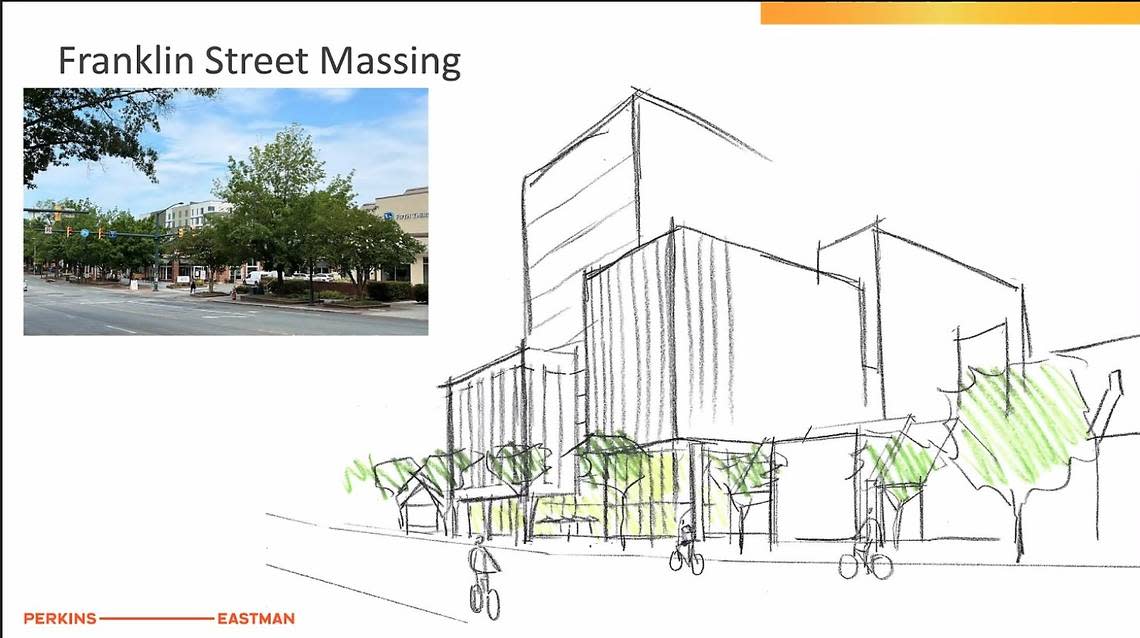
Decision to relocate or close
Chapel Hill’s downtown business district has a history of turnover, largely because of high land values and leasing rates, and too few year-round residents and customers, town officials have said. But new businesses want to be downtown, where there are 200 street-level businesses, said Matt Gladdek, executive director of the Chapel Hill Downtown Partnership.
Gladdek and Mayor Pam Hemminger told The N&O they have reached out with offers to help the businesses at 306 W. Franklin St.
It’s “scary when you have to think about relocating your business,” but having more companies and workers downtown will build a more sustainable economy and help everyone succeed, Hemminger said.
“I know they’re very upset, but they’ve known that this was coming, and it’s a two-year window, so we have plenty of opportunity to help them transition to a new space downtown or to figure out how to transition during construction and to come back in,” she said.
Paula Gilland said the relocation options have been few, including a UNC-owned storefront at 122 E. Franklin St. The timing was wrong for that space, which formerly housed the Benny Cappella’s pizza shop, she said.
Another, a ground-floor retail space in Grubb Properties’ seven-story Link Apartments Rosemary building, has not yet been approved. They also didn’t feel comfortable taking that space, Paula Gilland said, because it could be set aside for a minority-owned business.
Longfellow officials suggested they also could close and reopen after the new building is constructed, she said.
That was one option, Hemminger told The N&O in a text Wednesday. The other, she said, was buying out Purple Bowl’s lease so they could relocate to a new space.
The suggestion that they close “is a slap in the face to any business owner,” Paula Gilland said. “I have 64 people that work here, 10% of my staff has disabilities. I’m not going to close down for three years and reopen, and I don’t want to be in a dark, cavernous space.”
In an email Thursday, Longfellow spokesman Casey Angel provided a statement addressing those concerns. There are many details to work out because the development “is so early in the process,” he said.
“However, Longfellow has not suggested to anyone to close their business. Our team is looking forward to working with all of our partners and customers on timing and flexibility that ensures their success and the success of downtown Chapel Hill as a whole,” Angel said.
